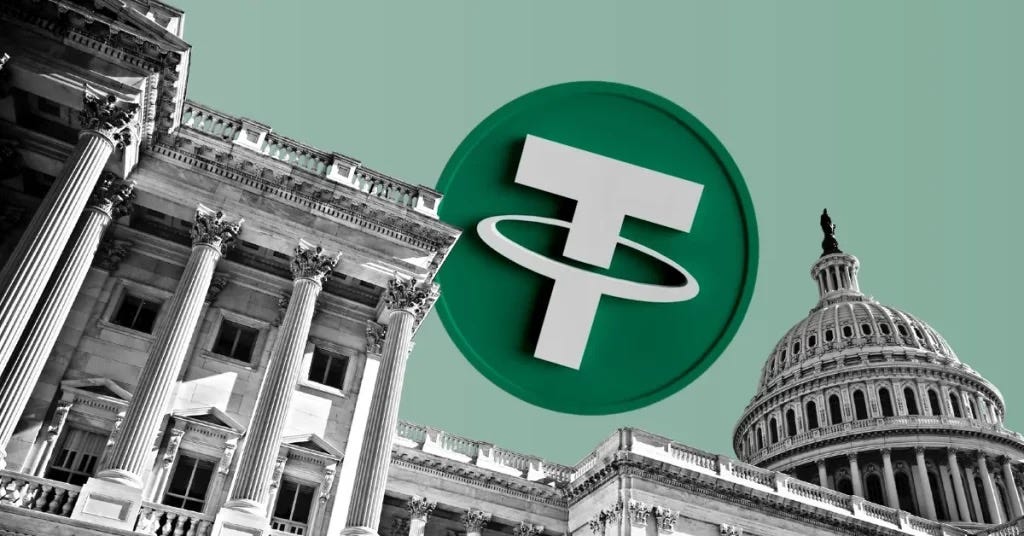US government vs. Tether (intelligence and risk assessment report)
The U.S. government’s investigation into Tether (USDT), one of the largest stablecoins, could have a significant impact on Bitcoin and the broader cryptocurrency market. Tether plays a crucial role as a bridge between traditional fiat currencies and the crypto ecosystem, with USDT being widely used in Bitcoin transactions. If the probe uncovers issues with Tether’s reserves or links to illicit activities, it could lead to a loss of confidence in Tether, potentially triggering a sell-off of USDT. This could destabilize liquidity and lead to price volatility in Bitcoin and other cryptocurrencies.
Additionally, Tether’s dominance as a stablecoin means that any disruption could affect the wider crypto trading environment, leading to lower trading volumes and possibly a decrease in Bitcoin prices, at least in the short term. The uncertainty surrounding Tether’s legal troubles has already raised concerns about transparency in the stablecoin market and could increase regulatory scrutiny across the entire crypto sector.
On the other hand, this investigation could pave the way for more robust and regulated alternatives, such as other stablecoins, which might help the industry grow in a more regulated and stable environment in the long run.
Worst scenario in theory
The worst possible outcome of the U.S. government’s investigation into Tether could be a scenario where it is revealed that Tether has insufficient reserves to fully back the USDT tokens in circulation, or that it has been involved in illicit financial activities, such as facilitating money laundering or sanction evasion. This could lead to several cascading effects:
1. Tether Collapse: If USDT is proven to be under-collateralized, it could lead to a collapse in confidence, causing a rapid devaluation of USDT. Since Tether plays a central role in cryptocurrency liquidity and trading, this could result in a liquidity crisis across exchanges.
2. Bitcoin Price Crash: Tether is used in a significant proportion of Bitcoin transactions, and a loss of confidence in Tether could trigger panic selling of Bitcoin and other crypto assets. A sharp sell-off could lead to a steep decline in Bitcoin’s price, possibly resulting in a short-term crash.
3. Market Contagion: Given that Tether is deeply integrated into the global cryptocurrency ecosystem, its collapse could spread to other crypto markets, affecting altcoins and other stablecoins, and causing widespread market instability.
4. Regulatory Crackdown: A worst-case scenario could also accelerate global regulatory actions against the entire cryptocurrency market. Governments may impose stricter regulations on stablecoins, exchanges, and even decentralized finance (DeFi) platforms, potentially stifling innovation and reducing access to crypto for retail and institutional investors.
5. Loss of Investor Confidence: A serious failure in Tether could undermine trust in the crypto space, leading to a prolonged bear market as investors move their capital out of cryptocurrencies into safer assets.
In such a scenario, the cryptocurrency market could face a massive decline in valuation and long-term repercussions regarding market sentiment and regulatory policies.
The chances of the worst-case scenario—Tether collapsing entirely—are generally considered low, but not negligible. Tether has repeatedly faced scrutiny over the years regarding its reserves, transparency, and links to regulatory concerns, but it has so far avoided any catastrophic fallout. Several factors suggest that while risks exist, the likelihood of a complete collapse is relatively limited:
1. Tether’s Response and Audits: Tether has maintained that it is sufficiently backed by reserves and has provided periodic attestations, though not full audits, to validate its holdings. While these attestations have not silenced all critics, they do suggest that a total failure may not be imminent .
2. Market Resilience: The cryptocurrency market has previously weathered significant blows, including legal challenges to other major players, without total collapse. Even if Tether faces legal penalties or issues with liquidity, it’s likely that other stablecoins, such as USDC or newer regulated alternatives, would step in to fill the gap .
3. Government Interests: A complete collapse of Tether could destabilize global crypto markets, which may not be in the best interests of regulators or governments, as they seek to regulate rather than completely dismantle the space. This suggests that even in a worst-case legal scenario, measures might be taken to mitigate the fallout.
4. Chances of Complete Collapse: Experts generally place the probability of a full-blown collapse or catastrophic event at a low to moderate risk, as it would require simultaneous failures in liquidity, regulatory breaches, and market reactions. However, increased regulatory scrutiny, ongoing investigations, and the complex financial structures Tether is tied to mean that the exact risk is hard to quantify but remains a concern for cautious investors .
Summary
In summary, while the risks are real and should not be dismissed, the overall market sentiment is that a worst-case scenario is possible but unlikely to materialize in full, especially without prior warning signs like sudden liquidity issues or legal rulings.



